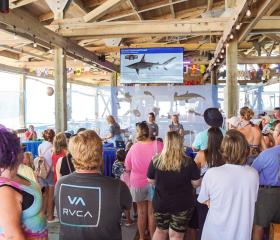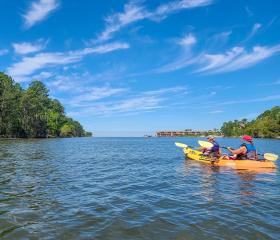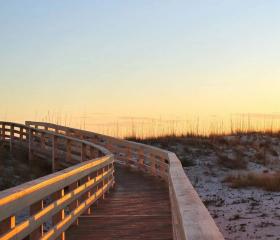Watch Visual Stories
Helpful Tips & Knowledge About Alabama's Beaches
Leave Only Footprints
Around fifteen years ago, community leaders realized we had a serious problem. The sea turtles weren’t nesting like they used to and the harmony of our local sea life and wildlife were imbalanced. We were met with a challenge on how to balance beach fun for people with a healthy ecosystem for wildlife. Together, our two communities, area business and concerned citizens organized in 2007 to create a beach sustainability program to protect our valuable natural assets. In 2015, the Beach Litter program was added to further protect the health and safety of the beach, surrounding waters, animals and, of course, beachgoers. Below are the beach rules and regulations established to help protect & maintain Alabama's Beaches.

Do Not Walk on Sand Dunes
Sand dunes act as barriers to protect the mainland against high waves and storm surges and are a vital part of the natural habitat of our beaches. Stay off the dunes and use beach walkovers and boardwalks as walking on the dunes is prohibited by law in both cities.

Recycle
Recycle when possible and use reusable products such as grocery bags and water bottles. This is an easy way you can help keep our community healthy. The less garbage that goes into landfills, the better.

Remove All Belongings From the Beach Each Day
Leave only footprints on the beach by removing all belongings, including toys, chairs, tents, coolers and blankets, by sunset each day. Doing so prevents them from being swept into the water and keeps our beaches clear for nesting sea turtles and rescue personnel. Please note that any items left on the beach before sunrise or after sunset will be discarded by beach patrol.

Keep Pets Off The Beach
While pets are welcome at many places in Gulf Shores and Orange Beach, they are prohibited from our beaches. If you want to bring your four-legged friend along to your vacation adventures, check out all of the pet-friendly spots in the area.

Do Not Dig Large Holes in Sand
If you dig a hole, fill it before you leave the beach. Holes are hazardous, particularly to sea turtles and humans. Large holes also become a hazard to our first responders during rescues. Any holes dug on Alabama's Beaches must not exceed 12 inches deep.

Avoid Using Bright Lights at Night
Avoid flashlights or flash photography at night, as the light can disorient the turtles. Stop by one of our Welcome Centers to get stickers to cover your phone flashlight or hand-held flashlight.
Share the Beach
Share the Beach follows US Fish and Wildlife Service's protocols under the endangered species recovery permit. Those who volunteer to patrol the beach, educate the public and school groups, conduct late-night observations, and assist with supply and equipment preparations. These efforts help ensure the protection of sea turtles.

Do Not Disturb Sea Turtles or Nests
Sea turtles visit our beaches every year to nest from May through October. In order to protect these turtles, Share the Beach was established to advocate for their livelihood and habitat. The purpose of this program is to reduce human-related influences on sea turtles, monitor their nests and hatchlings, and promote the conservation of these creatures. If you encounter a sea turtle nest, keep your distance and don't bother it. It is a federal crime to disturb sea turtles or their nests.

Do Not Disturb Marine Wildlife
If you spot frolicking marine life in the wild, it’s important to realize that human contact can cause trauma and disrupts their natural behaviors. Stay at least 50 yards from these animals and move slowly away if they show signs of disturbance. Refrain from feeding, touching or swimming with wild marine life, and don’t forget to put your boat’s engine in neutral when they are nearby. Don't worry, snapping a few pictures from a safe distance won't disturb them!
Ecotourism in Gulf Shores & Orange Beach
Gulf Shores and Orange Beach remains a beautiful and fun destination for tourists and residents alike as a result of continued sustainability and ecotourism initiatives.













